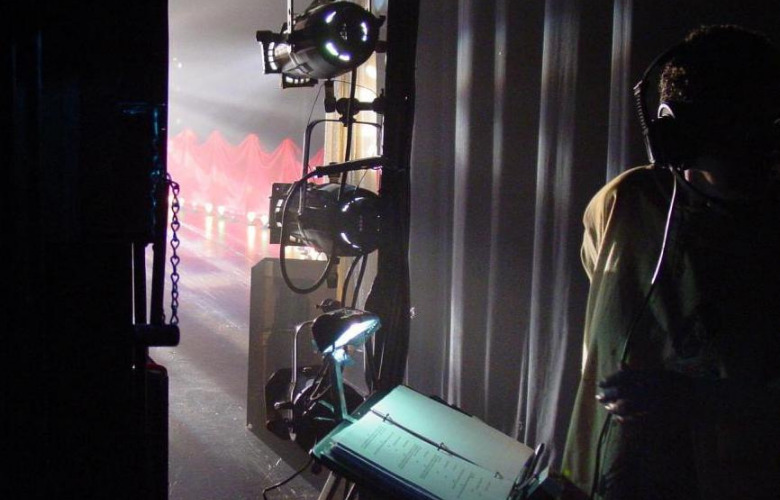
SMA is the Stage Managers’ Association. It is an organization based in the USA. However, its International Cohort is growing as well since it began in early 2019. A “UN of Stage Managers” with currently over 25 ambassadors from 15 countries on 6 continents. On July 5, 2021, SMA Director-at-Large David J. McGraw and Editor in Chief/International Cohort Chair Hope Rose Kelly from the USA met for an online discussion with SMA International Cohort Ambassador Anna Robb in Hong Kong. Together, they compared the work conditions of Stage Managers working in both regions and around the world. Drawing on their own experiences as stage manager as well as looking at a 2019 survey, their findings are profound and of imminent importance. We are sharing the highlights of their discussion in an article series of 4 parts. This is part 4.
In this fourth, final part, Dave, Hope, and Anna discuss who a stage manager reports to, team dynamics, and – last but not least – the rather complex topic of vacation time…
Dave: As always, exceptions are the rule. In most cases, you’ll be reporting to the producer. However, the producer may have intermediaries.
You’ll be working with the director and/or choreographer. Maybe they did recommend you. But they are not the ones making the final decision who to hire.
The SM can fall under different departments. Often under design, production, or technology. But sometimes also under artistic management.
Anna: In the circus world, especially in Macau, it is the Artistic Director who is responsible for hiring the stage management team.
In Hong Kong I’ve been hired by creative directors, producers, production managers, etc.
If I’m hired by the creative director, I’ll automatically assume I’ll have a more creative leadership role.
If instead I’m hired by the producer or a more technical person, I know I’ll be supporting their priorities and needs a bit more.
The dynamic of who you report to changes. And how your job evolves and flexes depending on who hires you is quite interesting.
Dave: I would say it is an advantage because it allows us to do quality control.
Anna: To have some autonomy and leadership without being under constant scrutiny by someone who is in the room, right?
Dave: Yes. Absolutely. I also like to not be part of the permanent staff. It gives me the freedom to call things out and intervene when necessary.
Dave: In the US you can often recommend your ASMs but not choose them. This can be difficult. Sometimes you might end up in an existing team in which they have more background knowledge than you, because they have been there longer. Yet you are put in charge of them.
Anna: Working Hong Kong and Macau I’ve been able to choose my team for the last 15 years.
This is also good because you own that decision. You are responsible for successes and failures. It is a good position to be in.
Anna: When you take over an existing team, you unavoidably take over the history that comes with it. It is a huge thing to have to navigate.
In addition, teams who work on a long-term show together become a clique. Which is both good and bad. Some of them can become resistant to change.
When someone new came in, I always tried to ask, “Tell us what you think. What can we do different/better? Give us your ideas and let’s try.”
When they did, we’d debate. If it would work for the team, we would do it.
The way The House of Dancing Water organization with line-ups, schedules, etc., worked over the years was not because of me, but because of the team who brought in their ideas.
Together, we evolved it all to an extent that went far beyond what I would have been able to achieve on my own.
Also, on our show in Macau, sometimes you were the leader, sometimes you had to follow. It depended on what position you filled that day. Calling, running tracks, etc.
Managing a complex team like that can be a difficult task on a long-term show.
Dave: In our 2019 SMA Survey we saw that almost 50% of stage managers in the US had no vacation time.
Anna: Vacation time is linked more to the culture of each country than to industry standards.
In Australia, for example, it is quite normal for people to go on vacation for 2 months. There is just this mentality that you take a break.
When I worked in Macau, I had 6 weeks of vacation per year. We earned leave days as well. This added up to almost 8 weeks off per year.
As Head of Department, I didn’t always take the full amount. But it was good to have a decent amount of vacation to, as an expat, be able to go home for a few weeks each year to be with far away family and friends.
Dave: Absolutely. Yet again, this is something that still needs to be improved in the US.
Working in a large regional theatre on a 44-46 week contract, so most of the year, I would accumulate at most 16 days of leave over the course of that time. Nowhere near enough to really recharge and have some quality time with family.
Dave: As stage manager you have the option to take leave on a long-running show like that. But there is no dark time for the show.
Anna: Is the show staffed enough for you guys to take comfortable vacation without you worrying about the show?
Dave: I have to say, most vacation days I accrued, I never took. Because I couldn’t see how it would work with me being away. There just wasn’t enough infrastructure. And many times, there just wasn’t anyone available to come in and cover for me.
Dave: Not very good. This is where we need to be better as well. We need to take a healthier approach.
Hope: Basically, once you have signed a contract you are locked in. That is the mentality in most regional theatres in the US.
It is very different to let’s say Germany where, for example, most theatres are closed in August. It seems they have a collective month off.
Anna: In France and Belgium, too. It’s just the culture of taking that time. Especially in Europe.
Also, here in the Chinese culture they do take their time off. For example, during Chinese New Year none of them are working. This can be a period of up to 3 weeks during which most businesses are closed and everyone spends quality time with their families.
If we have a show which starts shortly after Chinese New Year, we need to plan around it and get things done far in advance.
Dave: This is very interesting to hear. In the US, even if you’re unionized, the most protection you’ll get as a worker is that you get either Christmas Eve or Christmas Day off. Never both. That’d be asking too much.
Also, Monday used to be dark day on Broadway. Which was a great day to catch up on admin work or to have a quick breather.
Then, they realized they were losing out on potential income and that there are still tourists visiting on Monday. So now some shows perform on Monday as well.
The idea that all theatre would shut down for a certain amount of time, no matter how short, is unfathomable in the US for now.
Anna: This is very different to my international experiences.
I have to say, during the first 7 years of my children’s life I spent Christmas in the theatre, because I didn’t want to take a day off when the rest of my team was working. But this led to us always having the kids come in. They’d hang out and we’d have a big celebration all together.
And this highlights an important point: If you are in a position to influence the work-life balance of yourself and your team, you most definitely should!
I was the first person to have a child in the entire company. So, I started ‘Baby Mondays.’ Monday was the last day of work before each week’s dark. The babies would come in and crawl around the green room and get up to all kinds of mischief. It was a great family vibe and not frowned upon.
Then, when there got to be too many babies, we had to stop it. But it was a nice culture which shifted to yet another event.
From then on, whenever we had a validation (which was a run of the full show to train our understudies), the families would come in and this whole sea of kids would be there to watch their parents perform on stage.
As a working mom, I just know the importance of having my kids see and understand why I do what I do and why I am gone so many hours of the week. Also, it lets them be a part of my world.
Hope: Even here in the US theatres are starting to recognize that there is an element they need to make room for and support. The conversation of making space for caretaking and family is getting larger.
Dave: Yes, thankfully, I think we’re slowly moving away from the idea that you must leave home, cannot have a family, and must lead a solo life to work in theatre.
Most existing policies were built around that expectation.
Now, instead of it being something you only do until you’re thirty and then you’re gone, stage managers are thinking more of making their profession a long-term career. A promising shift in mindset, I must say!
For those of you who missed the first parts of the discussion:
Part 1
Part 2
and Part 3
Official Website of the SMA Stage Managers Association.
The SMA International Cohort page.
Dave McGraw, Hope Rose Kelly, and Anna Robb are all experienced entertainment professionals.
Dave has enjoyed a varied career in Arts Entrepreneurship
and Stage Management. Since 2017, he has served as the Program
Coordinator for the thriving Arts Administration program
at Elon University.
Hope is an Equity Stage Manager based in the Berkshires.
She has worked at many companies in the Northeast and
across the Unites States.
Anna is Co-Founder and Managing Director for TheatreArtLife.
She is an experienced Producer/Production Stage Manager.
Her 20-year work history spans Asia Pacific, the Americas, Africa,
the Middle East and Europe.
Keep Your Cool Backstage as a Stage Manager: 12 Insights
Don’t Wear That Hat: Theatre Superstitions and Their Origins


Liam Klenk was born in Central Europe and has since lived on four continents. Liam has always been engaged in creative pursuits, ranging from photography and graphic design, to writing short stories and poetry, to working in theatre and shows. In 2016, Liam published his first book and memoir, 'Paralian'.
Read Full Profile© 2021 TheatreArtLife. All rights reserved.

Thank you so much for reading, but you have now reached your free article limit for this month.
Our contributors are currently writing more articles for you to enjoy.
To keep reading, all you have to do is become a subscriber and then you can read unlimited articles anytime.
Your investment will help us continue to ignite connections across the globe in live entertainment and build this community for industry professionals.